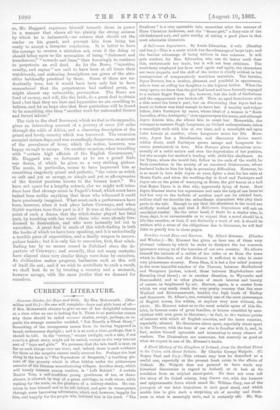A Ball-room Repentance. By Annie Edwardes. 2 vols. (Bentley and
Son.) —This is a story which has the advantage of large type, and the further advantage of being written in two volumes, . It will gain readers, for Mrs. Edwardes, who can do better work than this, understands her trade, but it will not bear criticism. The machinery employed has been used again and again, the characters are mere puppets, and the skill of the writer is chiefly evident in her management of comparatively worthless materials. The heroine, Joyce Dormer, has a mother, pleasant and youthful in appearance, who is bent on selling her daughter to the highest bidder. When the story opens, we learn that the girl had loved and been formally engaged to a certain Roger Tryan. He, however, lost the bulk of his fortune and the engagement was brolson off. Then an aged Scotchman with a title acted the lover's part, but on discovering that Joyce had no heart to bestow was kind enough to leave her. A wealthy and vulgar fellow, John Farintyre by name, whose ideal of a woman is " Rosie Lascelles, of the Ambiguity," then appears upon the scene, and although Joyce detests him, she allows him to court her. Meanwhile, she manages to ensnare Hugh Longmore, an Oxford undergraduate, takes a moonlight walk with him at one time, and a moonlight sail upon Lake Leman at another, when Longmore saves her life. More- over, Joyce has a Stradivarius, and discourses divine music within doors, until Farintyre grows savage and Longmore be- comes passionately in love. Miss Dormer gives indications °cos^ sionally of a noble nature and sees the degradation of her position, but she accepts her mother's leading with child-like obedience. As for Tryan, whom she would fain follow to the ends of the world, he finds consolation in the society of an unrefined Irishwoman, whose husband looks to him for help in pecuniary difficulties. However, he, is as much in love with Joyce as ever, fights a duel for her sake at Monte Carlo, and when the wedding-day is fixed and Farintyre and Joyce are on the point of marrying at Rome, the girl learns at a ball that Roger Tryan is in that city, apparently dying of fever. How Joyce Dormer shows her repentance and uses the help of one lover to find her way to the bedside of another need not be related here, neither shall we describe the subordinate characters who play their parts in the tale. Enough to say that the situations in the novel are skilfully worked up, and that A Ball-room Repentance will suit an uncritical reader. On the other hand, if there be a reader who, in these days, is so unreasonable as to expect that a novel should be a life-like creation, or that if not distinctly a work of art, it should be written with a sense of the obligations due to literature, he will find little to gratify him in these pages.






























 Previous page
Previous page